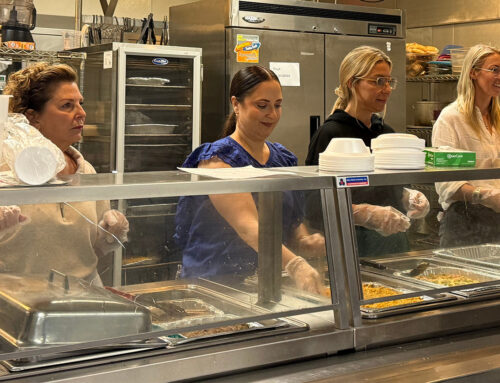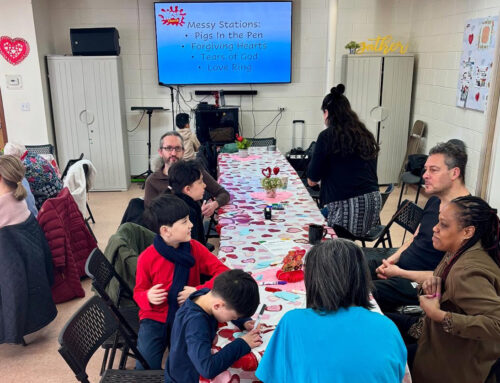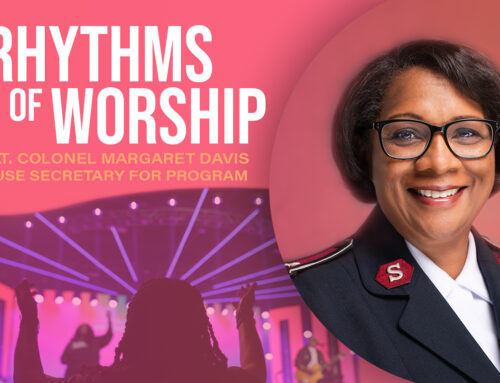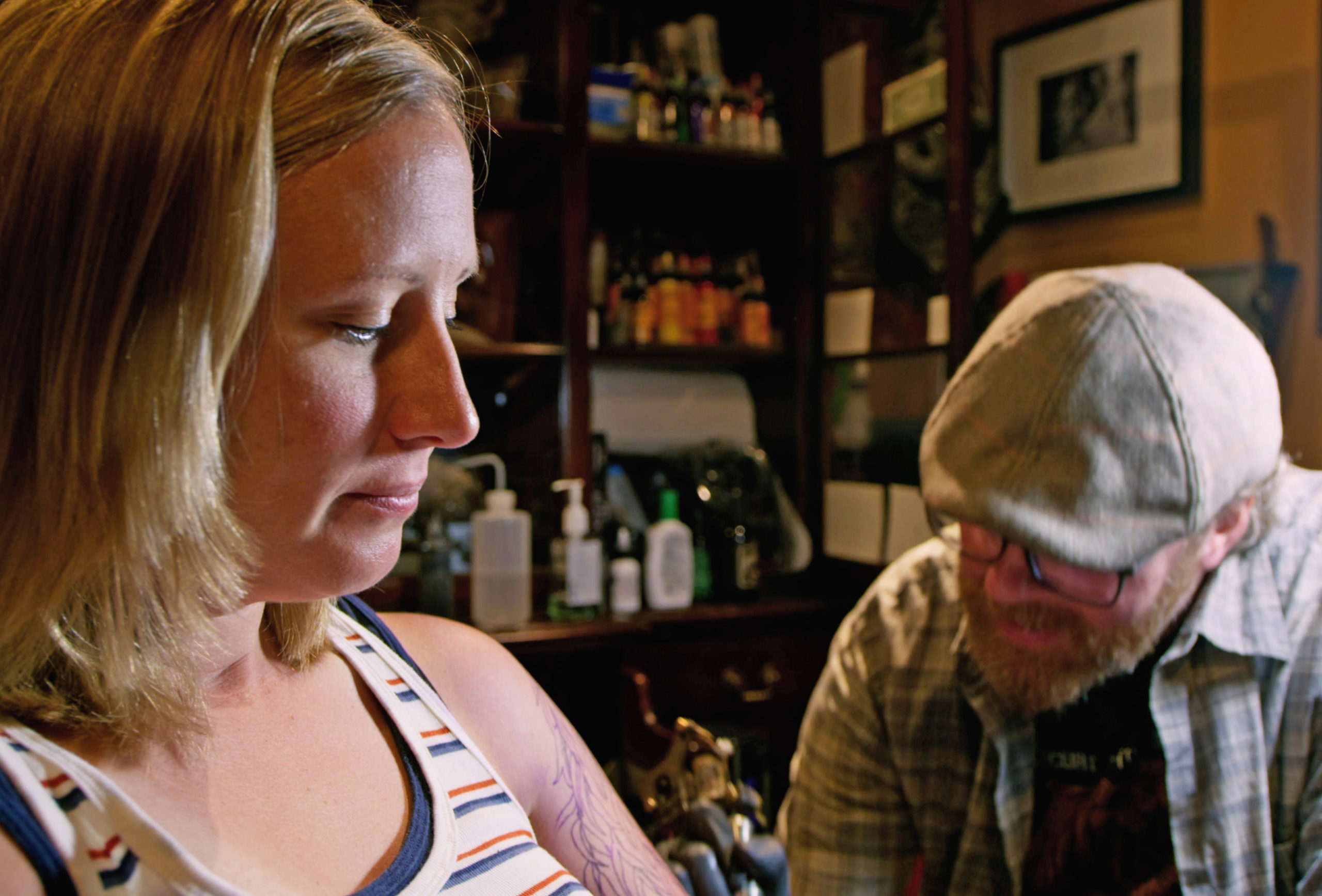
Hope, pearls and progress
by Retta Blaney
The fight against sexual trafficking requires a network of support and multiple programs.
Under the elevated train in a North Philadelphia neighborhood known for violent crime, drug dealing, and street prostitution, the first floor of a small row house serves as a refuge. Women who experience exploitation and sex trafficking can have a meal or snack, take a shower, change into clean clothes, seek help from a social worker, enjoy art and yoga classes, and relax on the couch and watch Netflix.
“We’re small but we’re mighty,” says Heather LaRocca, LCSW, director of the New Day to Stop Trafficking program for The Salvation Army Eastern Pennsylvania and Delaware Division.
In a neighborhood in Brooklyn, N.Y., where street prostitution and the threat of violence are at one of the highest rates in the state, a Salvation Army van arrives one night a month. A dozen or so volunteers and a couple of staff members venture out to greet the women and sometimes others who are entangled in this street life. The staffers give them canvas tote bags that contain a muffin or sandwich, gloves, scarfs, and information about Salvation Army support services.
In Western Pennsylvania, a staff of three Salvation Army employees continue to build a support network to meet the needs of their trafficked clients. In three years, they’ve acquired about 350 partners.
These efforts are among the Eastern Territory’s 15 multi-faceted anti-human trafficking programs, which are part of 41 such Salvation Army programs across the country. Together they served a total of 3,620 people in 2020.
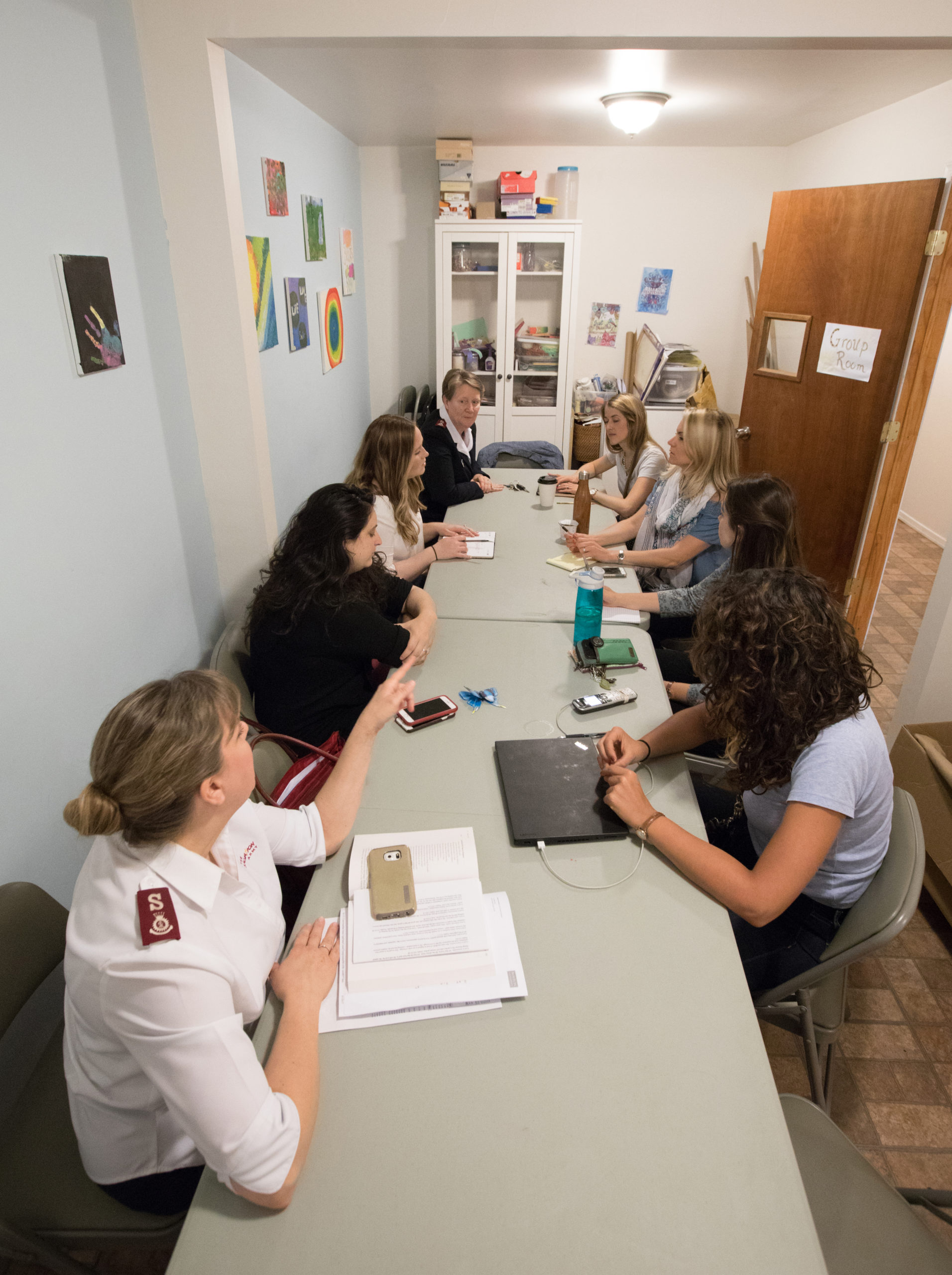
Photo by Ryan Love
The Salvation Army’s mission
Helping these survivors is very much in keeping with the Salvation Army’s mission, says Major Tawny Cowen-Zanders, MSNMP, CFRE, and divisional secretary for Greater Philadelphia.
“We work with them to help them see how very precious they are. We don’t see them as the world sees them. We see them as who they are, children of God.” She said this can only be done by “addressing the hope issue, helping them feel and believe and hope for something better.”
The barriers to reaching survivors are many. Most have experienced trauma from an early age, and many have substance abuse disorders and mental health disorders and are experiencing homelessness. Reaching out to them is important because they are far less likely to seek help than other crime victims, says Arielle Curry, anti-human trafficking coordinator for the Eastern Territory.
“We are working to train all departments in the trauma-informed model known as The Sanctuary Model,” Curry said, emphasizing the importance of avoiding words such as rescue, save, hooker, and addict. “We try to use person-first language. Instead of saying ‘a homeless person’ we would say ‘a person experiencing homelessness.’”
Since the 1800s, The Salvation Army in England has been involved in anti-human trafficking efforts. But for the most part, efforts in the United States didn’t begin in earnest until more than a century later. According to the International Labor Organization, it is estimated that human trafficking is a $150 billion criminal enterprise worldwide, with 40.3 million people experiencing this victimization at any time.
Standing together for change
In Philadelphia, the Salvation Army’s anti-trafficking approach is four-part: the New Day Drop-In Center, New Day Home, Anti-Trafficking Task Force, and Police Assisted Diversion. Support for clients is built around the belief that they are the experts of their own lives.
“We are working alongside them,” LaRocca says. “We’re not telling them what they need. They’re not going to make lasting change unless they’re the ones driving the bus. We hear their story and what goals they want to set. We build a relationship.”
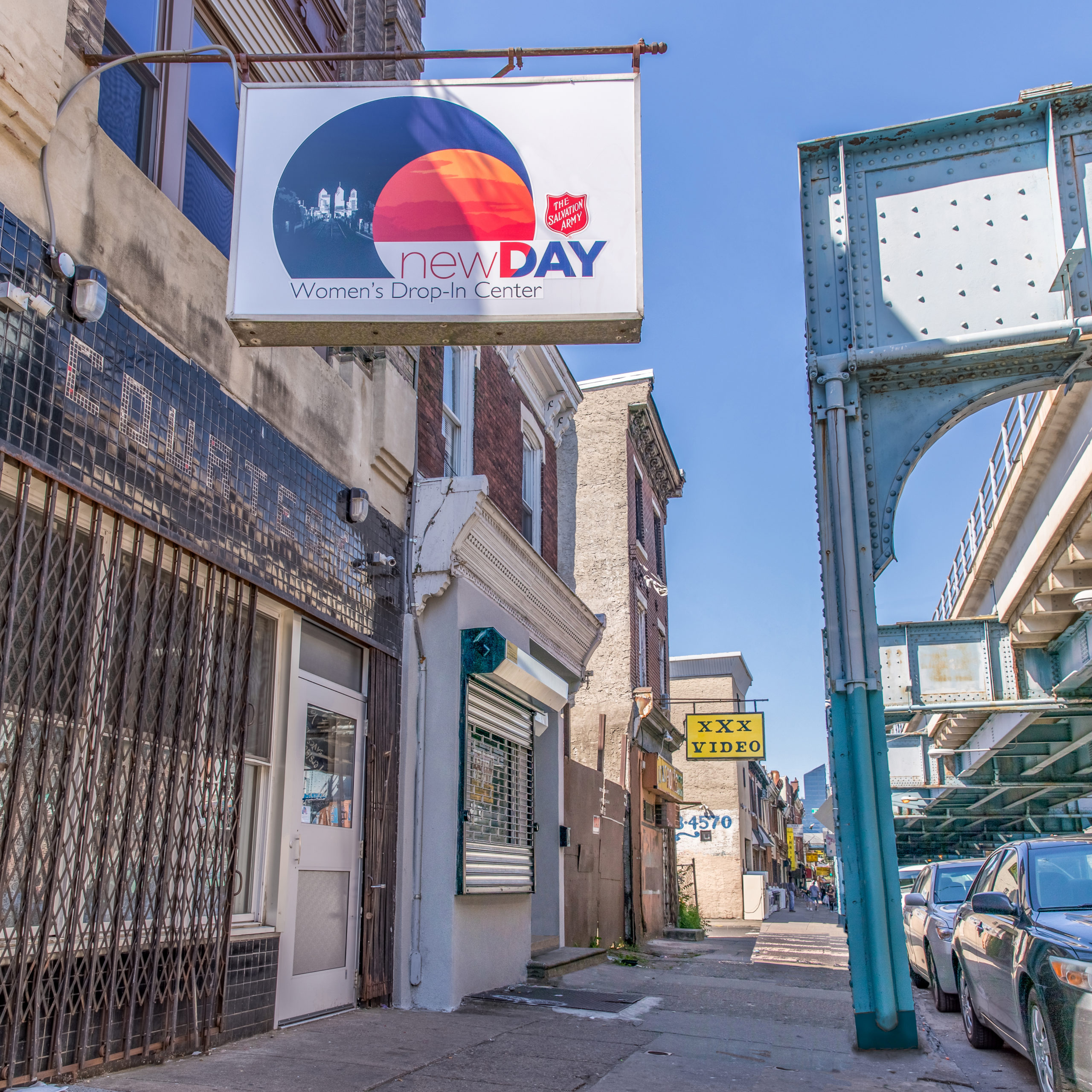
Photo by Ryan Love
Philadelphia’s involvement began in 2010 when the city started exploring anti–trafficking work. The Salvation Army and other organizations were part of the discussions. The New Day Drop-In Center was born as a collaborative effort; the Army took it over in 2014. Close to 60 people come each day now, down from more than 100 before the pandemic. In addition to being a welcoming haven in a rough neighborhood, diverse services—legal, youth, and immigration—are provided through outside partnerships. To honor the lives of all who enter, New Day also keeps track of the lives that have been lost.
“The women who come in feel so alone,” Cowen-Zanders says. “They know if something happens to them on the street there will be a place where they will be remembered.”
The New Day Home opened in February 2017 as a residence for survivors of sex or labor trafficking. Stays are for one to three years and include: earning a GED if needed; vocational training; trauma, and trafficking-informed treatment; activities for behavioral health; and daily skills acquisition-building, such as basic cooking and housekeeping.
Many of the people who move into the New Day Home are experiencing a safe, caring residence for the first time in their lives. A new residence will open in late October, if the renovation is on track, that will replace the current one, doubling the number of beds from 8 to 16.
The Police Assisted Diversion program sprang out of a Philadelphia Police Department effort to channel people arrested for drug offenses and petty crime into support programs rather than have them enter the criminal justice system. In 2016 they asked The Salvation Army to try a similar approach for people picked up for prostitution. In 2019 this collaborative effort became a New Day program.
The Anti-Human Trafficking Task Force was launched to combat human trafficking with a collaborative approach of federal and local law enforcement agencies and multiple social service organizations.
Flying a red flag
Last year, New Day served 1,169 trafficking survivors. The four programs have a total staff of about 35, with eight to 10 volunteers, only a handful now compared to the 20 to 30 pre-COVID-19. To keep themselves from burning out, they follow the Sanctuary Model, trauma-informed care that works to understand how trauma affects clients as well as the staff and organization.
This involves using tools such as Red Flag Meetings, which are scheduled shortly after a traumatic event, such as an overdose, to work together through what has happened. Leaders check on everyone to make sure they have a self-care plan to help eliminate the need to repair damage later.
“We as leaders have to genuinely care about the staff,” LaRocca says. “We’re on a journey together.”
The Salvation Army’s anti-trafficking program is one of the largest in the city, but few people know about it, she says.
“People know the visuals, like the red kettle and the thrift stores. They get one thing in their mind.”
The Salvation Army’s Western Pennsylvania Division, which encompasses 28 counties, had occasionally been asked by law enforcement to help find food or shelter for the trafficking survivors they encountered. As requests grew, the division applied for and received a federal grant in 2018 to start the LIGHT Project to develop a program of comprehensive services, for survivors of human trafficking.
“We’ve grown a lot quicker and faster than we thought but, unfortunately, the need is great,” said Sarah Medina, MSW, LSW, Anti-Human Trafficking Director for Western Pennsylvania.
The need is great
Since launching out of the division’s main office in West Pittsburgh in 2019, this vast collaboration of community-based partnerships has helped 42 survivors. Through the partnerships, they receive therapy, legal help for civil, criminal or immigration matters, as well as material help of hygiene products, new clothes, and housing from The Salvation Army. Requests from law enforcement to help survivors are met 24/7.
“Our clients have so many needs,” Medina says. “If a new need comes up, we’ll find a partner.”
The latest of these is a tattoo parlor that will cover up tattoos related to trafficking. The LIGHT Project also has an educational component that has trained 3,000 people about human trafficking red flags.
If a client can’t get to the office, a staff member will go to see that person. Medina said she recently drove two hours to Erie after a call from law enforcement. Since she wasn’t using a Salvation Army car, she sent the woman to a safe place to stay in an Uber and then met her there with personal products and clothes.
“We’re looking for the success with each client’s story. It looks so different with each one.”
A global problem
The Greater New York Division (GNY) has also been growing its anti-trafficking efforts, which began modestly in the 1980s with one officer ministering to people involved in street prostitution in Times Square. It wasn’t until 2018 that GNY began researching services being offered to women at high risk of human trafficking. Focusing on the fastest growing hotspots in the northeast, they zeroed in on illicit massage businesses in parts of Brooklyn.
“The fact is that human trafficking is happening in New York City as it is across the country and world,” said Director Jennifer L. Groff of the Corporate & Community Engagement Department in Greater New York. “These efforts are long overdue.”
Groff’s commitment was sparked in 2017 while she was in graduate school researching and writing a paper about human trafficking and survivors. She developed relationships with people working in the field. Realizing “this is where the unmet needs were” and wanting to create awareness in the division, she began working with Social Justice Secretary Major Susan M. Wittenberg to create the first program in New York.
The value of P.E.A.R.L. Essence
P.E.A.R.L. Essence, standing for Purposed, Empowered, Appreciated, Respected and Loved, launched in January 2018 to minister to women working in illicit massage parlors. These businesses were made up largely of women emigrating from China who had been defrauded into believing they would have a legitimate job as a masseuse. The barriers keeping them from leaving are hard to overcome such as poverty, the need for shelter, language differences, no work authorization, and fear of deportation.
Between 6 and 12 volunteers, along with a couple staff members, set out on foot with a list of the parlors, bleak boarded-up buildings with blackened windows. They offered small gifts and a list of Salvation Army services in the city. They also brought cookies for the owners to encourage them to allow the team entrance to meet the women.
At first, the women were extremely guarded. But P.E.A.R.L. Essence is “a seed-planting mission” and the team persisted. By the fifth outreach, five Mandarin-speaking volunteers had joined. One young woman, who looked about 16 and had always strongly resisted the team’s efforts, smiled, and told them her name.
“It was a beautiful moment of progress in her,” Groff said. “Doors began to open.”
In 2021 the Army’s anti-trafficking effort expanded to include monthly late night/early morning visits to East New York. Arriving in a Salvation Army van, the team of about 20 go out in threes between 11 p.m. and 3:30 a.m., knowing they are being watched by pimps who “don’t like anyone distracting their business plan for the night,” Groff says. “They take many safety precautions, frequently in collaboration with law enforcement, to ensure their team as well as the people with whom they are speaking remain safe.”
In encounters, that last only about a minute, the volunteers carefully approach the women—about 20 by the end of the night—most of whom are between 25 and 35, with smiles and questions about how they are. In time, the women “were joyful to see us,” Groff says. “They liked our attention. We know we are making a difference for those women.
“Their situation is dire. The Salvation Army’s programs are about helping people in destitute poverty.”
In December 2019 P.E.A.R.L. Essence began offering a seven–day emergency stay program where women who want to leave prostitution receive three meals a day, clothing, a private place to meet with their social worker and respite so they can “get on their feet while community partners help them find long–term housing.”
P.E.A.R.L. Essence is different from other human trafficking programs in the city, Groff says, because it restores choice to the women.
“We’re just building trust over time. They are used to people objectifying them and using them for their bodies. We have an interest in them as a person. It’s powerful.”
Launching ‘HOPE’
In September 2021, the Eastern Territorial Headquarters Communications Department launched its production entitled “HOPE: Stories of Survival,” a full-length documentary about the day-to-day lives of survivors after their trauma recovery.
The film, recently nominated for a New York Emmy Award, demonstrates how they managed to overcome fear and exploitation to emerge as beacons of hope for other people who face similar circumstances.
The documentary also led to a closer collaboration with law enforcement to ensure the safety of the Army’s volunteer teams.
Philadelphia’s Cowen-Zanders includes a tour of the rough, violent neighborhoods where exploitation regularly happens when she is introducing a new board member or donor to the work of The Salvation Army. As she says, people associate pictures of cute children in day care or the comforting environment of a shelter with the Army’s work, not the reality of street prostitution.
“This isn’t pretty, but it’s precious. These women are precious to Jesus. We hold this work in our hands like a precious jewel. We are honored to be there.”
Retta Blaney has won nine journalism awards and is the author of Working on the Inside: The Spiritual Life Through the Eyes of Actors, which features interviews with Kristin Chenoweth, Ann Dowd, Edward Herrmann, Liam Neeson, Phylicia Rashad, Vanessa Williams, and many more. You can find it on Amazon.com.
Read more from the latest issue of SAconnects.

